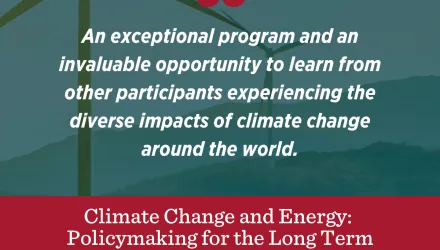The full discussion paper is available for download here: http://belfercenter.ksg.harvard.edu/publication/18564/
OVERVIEW
Developing country participation is an increasingly contentious issue—and a potential deal-breaker—in current efforts to forge new international agreements for addressing climate change. Emissions offsets, which allow rich countries to finance mitigation actions in developing countries, may offer a partial solution to the current impasse. This paper proposes a more expansive approach to offsets that would meet the different objectives of industrialized and developing countries while providing substantial support for long-term investments and policy changes to reduce greenhouse gas emissions in the developing world.
DISCUSSION
Developing and developed countries share a common view about climate change: each thinks the other should be doing more to solve the problem. Developed countries point to the rapidly growing contribution of the developing world, which now accounts for more than half of global greenhouse gas emissions, while poor countries point to the North's responsibility for historic emissions and emphasize their obligation to attend first to urgent development needs. For environmental and political reasons, finding a solution that does not require poor countries to accept binding emissions targets is crucial at this stage in the evolution of an international climate regime.
This paper argues that emission offsets offer a financially and politically viable path toward reconciling the divergent interests of developed and developing countries. Offsets can help industrialized countries meet short and long-term mitigation objectives while simultaneously providing a mechanism for transferring resources to the South. Realizing this potential requires changes to the existing Clean Development echanism (CDM). In particular, less emphasis on strict ton-for-ton accounting and more emphasis on a range of activities that could produce significant long-term benefits might allow the international debate to move forward in more productive directions.
KEY FINDINGS & RECOMMENDATIONS
- Change the criteria for offsets from "real, verifiable, and permanent reductions" to "actions that create real progress in developing countries toward mitigation and adaptation." Strict, project-based accounting rules, while designed to protect the environmental integrity of trading programs, have increased transaction costs and limited the utility of the CDM mechanism. Developing country actions are more important than the sanctity of short-term targets in making progress on mitigating climate change risk. An approach toward developing countries that focuses less on specific tons and artificial targets and more on evidence that positive and productive steps are being taken in exchange for resources expended is justified.
- Make a significant share of industrialized country commitments (whether international or domestic) achievable through offset payments to developing countries. If industrialized countries aimed to purchase offset credits equivalent to at least 10% of their overall emissions targets, it would greatly expand the flow of resources available to support developing country actions.
- Sell a specified portion of offset credits (perhaps 50%) up front and put the proceeds in a fund that would make investments in an array of projects throughout the developing world. By allowing greater flexibility to support large-scale or non-standard projects, this approach could increase the geographic diversity of mitigation activities and reduce transaction costs. Some ex-ante possibility exists that not all fund investments would deliver expected results, but this risk could be managed by viewing funded actions collectively as a portfolio and by implementing ex-post adjustments in cases of severe non-performance or poor management.
- Focus international negotiations on specific guidelines for an international offsets program. Key issues include criteria for eligible activities, policies, and investments; requirements for documentation or accountability; mechanisms for ex-post adjustment; criteria for the distribution of funds; and set-asides, if any, for particular types of projects or technologies. All options should be on the table, and negotiators should be willing to take risks and to accept the possibility that some actions might fail or only partially succeed.
- Negotiations should delegate clearly delineated tasks to new and existing institutions for the purpose of managing and safeguarding the offsets program consistent with negotiated guidelines. Specifically, the authors recommend giving the World Bank and the Climate Secretariat in Bonn lead roles in program implementation and information-sharing, respectively. In addition, they propose a 10-member committee composed of parties to the United Nations Framework Convention on Climate Change to oversee the new offsets program and an informal contact group of international organization officials to address potential tensions or conflicts with other international programs or policies.
CONCLUSIONS
International agreements and institutions are more likely to succeed if they are responsive to the needs and self-interest of individual countries. Given the importance of global cooperation to address climate change, a rigid focus on ensuring that offset policies do not undermine the sanctity of short-term targets—especially if it reduces the prospects for developing-country participation—is misplaced. This proposal recognizes that poor countries will do significantly more if resources are available and that industrialized countries require accountability for the resources they provide. It is based on the contention that offsets, as a mechanism for making sustained resource transfers to developing countries, are likely to be more politically feasible than other funding options. Overall, the proposal takes into account the distinct interests of both industrialized and developing countries by emphasizing environmental and development needs simultaneously.
Keeler, Andrew G. and Alexander Thompson. “Industrialized-Country Mitigation Policy and Resource Transfers to Developing Countries: Improving and Expanding Greenhouse Gas Offsets—Summary.” Harvard Project on Climate Agreements, Belfer Center, September 2008



